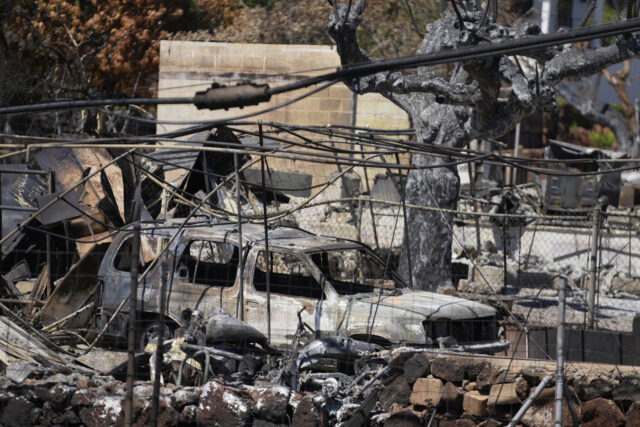LAHAINA, Hawaii (AP) — As Hawaii residents mourned those killed in ferocious wildfires, officials warned that the full human and environmental toll was not yet known and the recovery only just beginning from the destruction wrought by flames that galloped a mile every minute.
Twenty dogs and dozens of people will make their way through neighborhoods reduced to ash, searching burnt out cars and homes for the dead. With the toll at 96, this is already the deadliest U.S. wildfire in more than a century. Two fires have not yet been completely contained, including the one that demolished the historic town of Lahaina, according to an update from Maui County late Sunday.
Even where the fire has retreated, authorities have warned that toxic byproducts may remain, including in drinking water, after the flames spewed poisonous fumes. And many people simply have no home to return to — so authorities plan to house them in hotels and vacation rentals.
The blaze that swept into centuries-old Lahaina on Tuesday destroyed nearly every building in the town of 13,000, leaving a grid of gray rubble wedged between the blue ocean and lush green slopes. That fire has been 85% contained, according to the county, while the Upcountry fire has been 60% contained.
“There’s very little left there,” Gov. Josh Green said, holding up a map of the area titled “Buildings Damaged in Maui Wildfires Lahaina Area.” He added that “an estimated value of $5.6 billion has gone away.”
Crews with cadaver dogs had covered just 3% of the search area, Maui Police Chief John Pelletier said Saturday.
When teams “do come across scenes in houses or businesses, it is very difficult for them because they know, ultimately, they will be sharing with our people that there have been more fatalities. I do expect the numbers to rise,” Green said.
The cause of the wildfires is under investigation, and Green said authorities would also examine their response. One fire, for instance, was thought to be out but later flared again. Before a fire engulfed Lahaina, Maui County officials also failed to activate sirens that would have warned the entire population and instead relied on social media posts.
Fueled by a dry summer and strong winds from a passing hurricane, the flames on Maui raced through parched brush — one moving as fast as 1 mile (1.6 kilometers) every minute, according to Green.
“With those kinds of winds and 1,000-degree temperatures, ultimately all the pictures that you will see will be easy to understand,” he said.
The fires are Hawaii’s deadliest natural disaster in decades, surpassing a 1960 tsunami that killed 61 people. They also surpassed the 2018 Camp Fire in northern California that left 85 dead and destroyed the town of Paradise.
Maria Lanakila Church in Lahaina was spared from the flames that wiped out most of the surrounding community, but with search-and-recovery efforts ongoing, its members attended Mass up the road on Sunday. The Bishop of Honolulu, the Rev. Clarence “Larry” Silva, presided.
Taufa Samisoni said his uncle, aunt, cousin and the cousin’s 7-year-old son were found dead inside a burned car. Samisoni’s wife, Katalina, said the family would draw comfort from Silva’s reference to the Bible story of how Jesus’ disciple Peter walked on water and was saved from drowning.
“If Peter can walk on water, yes we can. We will get to the shore,” she said, her voice quivering.
During the Mass, Silva read a message from Pope Francis, who said he was praying for those who lost loved ones, homes and livelihoods. He also conveyed prayers for first responders.
Meanwhile, Hawaii officials urged tourists to avoid traveling to Maui as many hotels prepared to house evacuees and first responders.
Green said 500 hotels rooms will be made available for locals who have been displaced. An additional 500 rooms will be set aside for workers from the Federal Emergency Management Agency. Some hotels will carry on with normal business to help preserve jobs and sustain the local economy, Green said.
The state wants to work with Airbnb to make sure that rental homes can be made available for locals.
J.P. Mayoga, a cook at the Westin Maui in Kaanapali, is still making breakfast, lunch and dinner on a daily basis. But instead of serving hotel guests, he’s been feeding the roughly 200 hotel employees and their family members who have been living there since Tuesday.
His home and that of his father were spared. But his girlfriend, two young daughters, father and another local are all staying in a hotel room together, as it is safer than Lahaina, which is covered in toxic debris.
“Everybody has their story, and everybody lost something. So everybody can be there for each other, and they understand what’s going on in each other’s lives,” he said of his co-workers at the hotel.
___
Weber reported from Los Angeles. Associated Press journalists Haven Daley in Kalapua, Hawaii; Ty O’Neil in Lahaina, Hawaii; Bobby Caina Calvan and Beatrice Dupuy in New York; Sara Cline in Baton Rouge, Louisiana; and Pat Eaton-Robb in Hartford, Connecticut, contributed to this report.
___
Associated Press climate and environmental coverage receives support from several private foundations. See more about AP’s climate initiative here. The AP is solely responsible for all content.

COMMENTS
Please let us know if you're having issues with commenting.